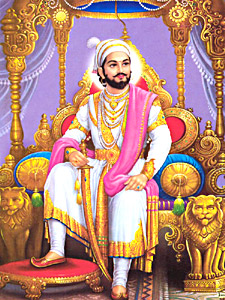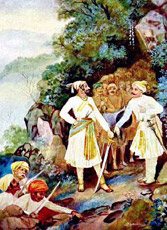 Administration under the reign of Shivaji was very efficient. Like all other medieval ruler, Shivaji was a despot with all powers concentrated in his hands. He possessed all executive and legislative powers. Shivaji proved himself successful as a born-leader of man, a capable soldier, a successful commander and an proficient administrator. He was the commander-in-chief of the army and had the highest fountain of justice in his kingdom. But, Shivaji did not use his powers to attain his selfish ends. He used it for the welfare of his subjects
Administration under the reign of Shivaji was very efficient. Like all other medieval ruler, Shivaji was a despot with all powers concentrated in his hands. He possessed all executive and legislative powers. Shivaji proved himself successful as a born-leader of man, a capable soldier, a successful commander and an proficient administrator. He was the commander-in-chief of the army and had the highest fountain of justice in his kingdom. But, Shivaji did not use his powers to attain his selfish ends. He used it for the welfare of his subjects
Central Administration of Shivaji
Shivaji was assisted by eight ministers in his administration. Each of them was the head or the pradhan of the department. The prime minister or the peshwa enjoyed superiority among his colleagues. He looked after the general administration and welfare of the kingdom, promote harmony in the administration, represent the king in his absence and put his seal below the king`s to all royal letters and dispatches. The Amatya or Majumdar was responsible for the account of income and expenditure of the state. The Mantri or Waqia-Nawis was responsible for the personal safety of the king and supervise his daily routine-work. The duty of the Sachiv was to see that all royal letters and dispatches were drafted in the proper style. He also checked the accounts of the paraganas. The Sumant or Dabir was the foreign minister. He advised the king regarding questions of war and peace with other states, received foreign ambassadors, collected news from other states and advised the king in appointing ambassadors to foreign states. The Senapati or Sar-i-Naubat was in charge of recruitment, organisation, and discipline, training of soldiers and arranging their supplies. Pandit Rao or Danadhyaksha looked after the charitable and religious works of the state. He also tried to attempt moral uplift of the people. The Nyayadhish was next to the king, and was the highest judicial authority in the kingdom.
Besides these eight ministers, chitnis or munshi were other important officers who looked after the correspondence of the state. Every minister was assisted in his work by a host of junior officers, important among them being diwan, majumdar, phadnis, subnis, karkhani, chitnas, jamadar and potnis. Shivaji, thus, had organised a systematic and quite efficient administration at the centre.
Provincial Administration of Shivaji
 The kingdom of Shivaji was divided into three provinces. Each was ruled by a governor. The Northern Province included Dang, Baglana, Koli Pradesh, south of Surat, Konkan, north of Mumbai and the Deccan plateau in the south of Pune. It was under More Trimbalc Pingle. The southern province included Konkan, south of Mumbai, and the north Kanara coast. It was governed by Aunaji Datto. The southeastern province which was under Dattaji Pant included the districts of Satara and Koihapur of the Deccan plateau, the districts of Dharwar to Kopal west of the river Tungabhadra in Karnataka.
The kingdom of Shivaji was divided into three provinces. Each was ruled by a governor. The Northern Province included Dang, Baglana, Koli Pradesh, south of Surat, Konkan, north of Mumbai and the Deccan plateau in the south of Pune. It was under More Trimbalc Pingle. The southern province included Konkan, south of Mumbai, and the north Kanara coast. It was governed by Aunaji Datto. The southeastern province which was under Dattaji Pant included the districts of Satara and Koihapur of the Deccan plateau, the districts of Dharwar to Kopal west of the river Tungabhadra in Karnataka.
However, he could not consolidate his hold over this territory and ruled it by sheer force. Besides, Shivaji collected taxes from the territory of Kanara, south Dharwar, Sondha and Bedmir though it was yet under dispute and it was conquered just before the death of Shivaji.
Military Administration of Shivaji
Shivaji`s military administration was equally successful. His ranking of his officers both in the infantry and the cavalry, payment of wages of soldiers on the fixed day, personal supervision of their recruitment, training and promotion, etc. were all winning measures. His guerrilla system of warfare and administrative measures concerning the forts were, in a way, novelties of his military administration while keeping soldiers busy in fighting for eight months provided them the best possible training in the art of fighting. His army observed high morality. Shivaji made certain other regulations as well concerning the army which were strictly enforced. Thereby, he was able to build up a strong fighting force which virtually became invincible m the seventeenth century. Shivaji also organised a navy which successfully safeguarded the coast-line and trade of the kingdom.
Revenue Administration of Shivaji
Revenue System during the reign of Shivaji was quite an efficient one. Currency, trade tax and land revenue were the most important sources of the fixed income of Shivaji. Shivaji collected the chauth and sardeshmukhi from the territory which was either under his enemies or under his own influence. The revenue system of Shivaji was Ryotwari in which the state established direct contact with the peasants. The revenue system of Shivaji enhanced the prosperity of his subjects.
Thus, the kingdom of Shivaji was well-administered. He has been regarded as one of the great personalities of medieval India because he provided an efficient administration.



















